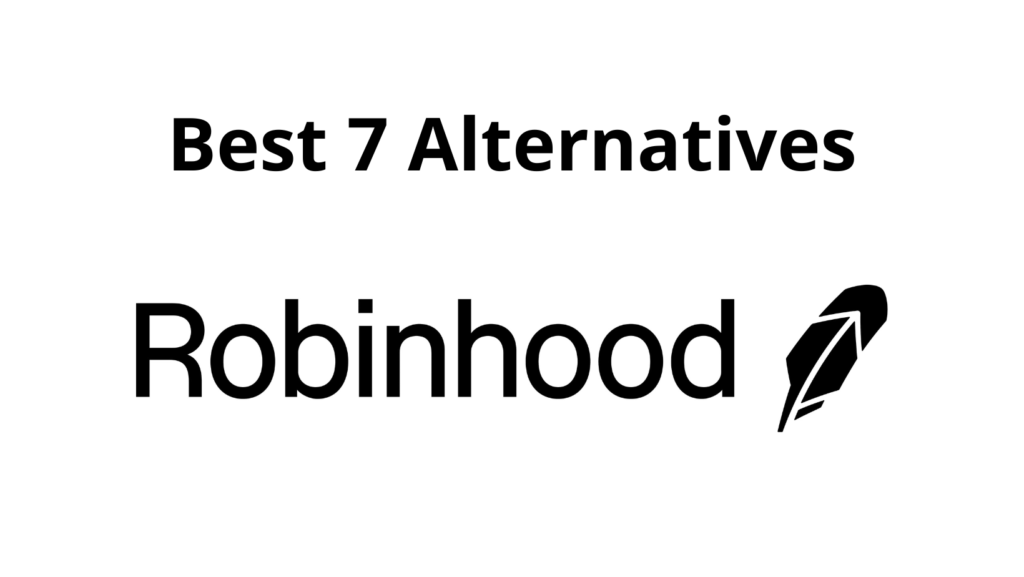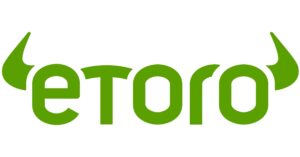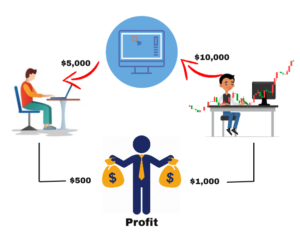There are many Robinhood alternatives in the market, each with their own unique features and advantages. Here are some popular alternatives to Robinhood: Fidelity, TD Ameritrade, ETRADE, Webull
Table of Contents

What is Robinhood?
Robinhood is a US-based financial technology company that offers a mobile app and web platform for commission-free trading of stocks, ETFs, options, and cryptocurrencies. The platform was launched in 2013 and has gained significant popularity for its user-friendly interface, no-fee trades, and easy-to-use mobile app.
Robinhood’s main offering is its commission-free trading, which means that users can buy and sell stocks, ETFs, options, and cryptocurrencies without paying any fees or commissions. The platform also offers a range of other features, such as real-time market data, research tools, and a community of traders.
However, it’s important to note that while Robinhood’s commission-free trading model may be attractive to many investors, the platform has faced criticism for its business practices, particularly related to its payment for order flow model and its lack of transparency around its pricing practices. It’s important to do your own research and fully understand the risks and benefits of using any investment platform before making any investment decisions.
Overview of Robinhood
How does Robinhood Work?
Here is a step-by-step guide on how Robinhood works:
- Create an account: To use Robinhood, you’ll need to create an account. You can sign up for an account on the Robinhood website or mobile app.
- Add funds to your account: Once you’ve created an account, you’ll need to add funds to it. Robinhood allows users to link their bank accounts and transfer funds directly into their Robinhood account.
- Choose your investments: After you’ve funded your account, you can start investing. Robinhood allows users to buy and sell stocks, ETFs, options, and cryptocurrencies.
- Place a trade: To place a trade, you’ll need to search for the investment you want to make, enter the amount you want to invest, and confirm your trade.
- Monitor your investments: Robinhood allows users to monitor their investments in real-time. The mobile app is particularly popular and allows users to monitor their investments and place trades on-the-go.
- Sell your investments: When you’re ready to sell your investments, you can do so through the Robinhood platform. You can either sell your entire position or sell a portion of it.
An Easy-To-Understand Platform
Robinhood is generally considered to be a user-friendly platform, particularly for those who are new to investing. The platform has a simple and intuitive interface that makes it easy to navigate and place trades. The mobile app is particularly popular and allows users to monitor their investments and place trades on-the-go.
Robinhood also offers a range of educational resources, such as articles and videos on investing, to help users learn about investing and make informed decisions. In addition, the platform has a community of traders who can share insights and ideas.
Overall, while there may be some complexities to investing that are beyond the scope of what Robinhood offers, the platform is generally considered to be an easy-to-understand option for those who are new to investing or who want a simple and user-friendly trading experience.
IRA Compatibility
Yes, Robinhood offers Individual Retirement Accounts (IRAs) for customers who want to save for retirement. There are two types of IRAs available on the Robinhood platform: traditional and Roth.
A traditional IRA is a tax-advantaged retirement account in which contributions may be tax-deductible and earnings grow tax-free until withdrawals are made in retirement. With a traditional IRA, taxes are paid on the money when it is withdrawn during retirement.
A Roth IRA is another type of tax-advantaged retirement account that allows for after-tax contributions. The earnings grow tax-free, and withdrawals are tax-free in retirement. Unlike a traditional IRA, there are no required minimum distributions (RMDs) with a Roth IRA.
Both traditional and Roth IRAs have annual contribution limits set by the IRS, and Robinhood provides tools and resources to help users understand and manage their retirement accounts.
Automated Investing
Robinhood does offer a feature called Robinhood Auto-Invest that allows users to automate their investment strategy. Here’s how it works:
- Set up a recurring deposit: First, users need to set up a recurring deposit to their Robinhood account. This can be done by linking a bank account and choosing a dollar amount to deposit on a regular basis.
- Choose your investments: Users can then choose the stocks, ETFs, or cryptocurrencies they want to invest in.
- Set up automatic investments: Once investments have been chosen, users can set up automatic investments to occur at regular intervals, such as weekly or monthly.
- Monitor and adjust: Users can monitor their investments through the Robinhood app and make adjustments to their investment strategy as needed.
Why Robinhood Might Not Be Right for You
While Robinhood is a popular investment platform that is known for its user-friendly interface and commission-free trades, there are several reasons why it may not be the right choice for everyone. Here are a few potential drawbacks to consider:
- Limited investment options: While Robinhood allows users to invest in stocks, ETFs, options, and cryptocurrencies, the platform does not offer more advanced investment options, such as mutual funds, bonds, or futures. This means that users who are looking for a more diverse investment portfolio may need to use additional investment platforms.
- Lack of research and analysis tools: Robinhood’s platform is designed to be simple and easy to use, which means that it does not offer in-depth research and analysis tools that more experienced investors may require. This can make it more difficult to conduct thorough research and make informed investment decisions.
- Limited customer support: While Robinhood offers customer support, it may not be as robust as other investment platforms. Some users have reported long wait times to get in touch with a customer service representative, and there may be limited options for personalized support.
- Risk of investment losses: As with any investment platform, there is always the risk of investment losses with Robinhood. While the platform is designed to be easy to use, it’s important to carefully consider your investment options and goals before making any investment decisions.
- Security concerns: Like any online platform, there is always the risk of security breaches and fraud. While Robinhood takes measures to protect user information and accounts, users should always take steps to protect their personal information and monitor their accounts for any suspicious activity.
The Robinhood “Meme” Stocks Issue
The “meme” stocks issue refers to a situation that occurred in early 2021 when several stocks, including GameStop and AMC Entertainment, experienced a surge in value due to social media hype and the actions of individual investors. This surge was fueled, in part, by discussion on online forums like Reddit, and many of these investors used platforms like Robinhood to purchase these stocks.
As the value of these stocks increased, some large hedge funds found themselves on the losing side of the trade, and this created a frenzy of activity on both sides of the trade. As a result, Robinhood and other investment platforms faced challenges managing the high volume of trades and the volatility of these stocks.
In response, Robinhood and other platforms temporarily restricted trading of these stocks, which caused a backlash from users and criticism from regulators. Some users accused Robinhood of favoring hedge funds over individual investors and of unfairly restricting their ability to trade these stocks.
The situation brought attention to issues of market manipulation, the role of social media in influencing stock prices, and the potential risks of investing in highly volatile stocks. It also led to calls for greater regulation of investment platforms and increased transparency around investment activity.
While Robinhood was at the center of this controversy, it is important to note that the situation was not unique to Robinhood, and other investment platforms also faced challenges managing the high volume of trades and volatility of these stocks. It’s important for investors to carefully consider the risks associated with any investment and to make informed decisions based on their individual goals and circumstances.
App Outages
Robinhood has experienced several app outages over the years, with some users reporting difficulty accessing their accounts, making trades, or viewing their portfolios during these outages. The most notable outage occurred in March 2020, when the platform experienced several days of downtime during a period of extreme market volatility.
These outages have been a source of frustration for some Robinhood users, who have criticized the platform for its handling of these situations. Some users have reported losing money or missing out on potential gains due to the app outages.
In response, Robinhood has taken steps to improve its infrastructure and prevent future outages. The platform has increased its staffing levels and implemented additional safeguards to help ensure that its systems can handle high volume trading periods. It has also made changes to its communication strategy to keep users informed of any issues that may be affecting the platform.
While app outages can be frustrating for users, it’s important to remember that they can happen on any investment platform, and it’s important to have a plan in place in case of technical difficulties. It’s also important to carefully consider your investment options and goals before making any investment decisions, and to be prepared for the possibility of market volatility or other unforeseen circumstances.
SEC Fines & Regulatory Trouble
Robinhood has faced a number of regulatory challenges and fines from the U.S. Securities and Exchange Commission (SEC) over the years.
In December 2020, Robinhood agreed to pay a $65 million fine to settle SEC charges that it misled customers about how it made money from its commission-free trades. The SEC found that Robinhood made misleading statements to customers about its revenue sources, including the fact that it received payment for order flow from high-frequency trading firms.
In June 2021, Robinhood agreed to pay a $70 million fine to settle charges that it caused “widespread and significant harm” to its customers by displaying misleading information about their cash and buying power. The SEC found that Robinhood displayed inaccurate information to users about how much cash was in their accounts, how much buying power they had, and the price of options trades, among other issues.
In addition to these fines, Robinhood has faced regulatory scrutiny and criticism for other issues, including the way it handles margin accounts, its options trading platform, and its customer support processes. The platform has also faced lawsuits from customers who have experienced losses due to technical issues or other problems on the platform.
What to Look For in a Robinhood Alternative
If you’re considering a Robinhood alternative, there are several factors you may want to consider when evaluating different investment platforms. Here are a few things to look for:
- Fees: One of the primary reasons people choose Robinhood is its commission-free trades. When considering an alternative platform, you’ll want to look at the fees charged for trading and other services. Some platforms may charge per-trade fees, while others may charge a monthly or annual fee.
- Investment options: Different platforms may offer different investment options, such as stocks, bonds, mutual funds, ETFs, or cryptocurrencies. Consider your investment goals and the types of assets you’re interested in trading when evaluating different platforms.
- Ease of use: Many investors appreciate Robinhood’s simple, user-friendly interface. When considering an alternative platform, consider how easy it is to navigate and use. Look for a platform that offers a mobile app and a desktop interface that is intuitive and easy to use.
- Customer support: If you run into issues with your account or have questions about trading, you’ll want to be able to get in touch with customer support quickly and easily. Look for a platform that offers a variety of customer support options, such as email, phone, or live chat, and check reviews to see what other customers have to say about their experiences.
- Regulatory compliance: It’s important to make sure any investment platform you use is in compliance with regulatory requirements and has a good reputation in the industry. Check to see if the platform is registered with the Securities and Exchange Commission (SEC) or other regulatory agencies, and look for reviews or ratings from independent sources.
Why Did Some Investors Leave Robinhood?
There are several reasons why some investors have left Robinhood, despite the platform’s popularity and ease of use. Here are a few possible reasons:
- Technical issues: Robinhood has experienced several outages and technical issues over the years, which have prevented some users from making trades or accessing their accounts. This has led to frustration and a loss of trust among some investors.
- Lack of investment options: While Robinhood is known for its commission-free stock trading, the platform may not offer as many investment options as other platforms. Some investors may be looking for a platform that offers a wider range of investment options, such as mutual funds or bonds.
- Controversies: Robinhood has been at the center of several controversies over the years, including its handling of the “meme stock” phenomenon in early 2021. Some investors may have lost trust in the platform due to these controversies.
- Regulatory challenges: As I mentioned earlier, Robinhood has faced a number of regulatory challenges and fines from the SEC over the years. Some investors may be concerned about the platform’s compliance with regulatory requirements and its overall reputation in the industry.
- Customer support: Some investors have reported issues with Robinhood’s customer support, citing long wait times or difficulty getting in touch with a representative. This may be a concern for some investors who value responsive and helpful customer support.
The Best 7 Alternatives to Robinhood
SoFi Active Investing
SoFi (short for Social Finance) is a personal finance company that offers a variety of financial products and services, including student loan refinancing, mortgages, personal loans, credit cards, and investment accounts. The company was founded in 2011 and is headquartered in San Francisco, California.
Fidelity
Fidelity is a financial services company that provides a range of investment and financial planning products and services to individual investors, institutions, and financial advisors. The company was founded in 1946 and is based in Boston, Massachusetts. Fidelity offers a variety of investment options, including mutual funds, exchange-traded funds (ETFs), stocks, bonds, and options. In addition to its investment products, Fidelity also provides a range of financial planning services, such as retirement planning, estate planning, and wealth management. Fidelity is known for its comprehensive research and analysis tools, educational resources, and robust trading platform, making it a popular choice for investors of all levels of experience.
For crypto: Binance
Binance is a cryptocurrency exchange that provides a platform for buying, selling, and trading cryptocurrencies. The company was founded in 2017 and is based in Malta, but has since expanded to offer its services globally. Binance is known for its extensive selection of cryptocurrencies, with over 100 cryptocurrencies available for trading on its platform. In addition to its cryptocurrency exchange, Binance also offers a range of other products and services, including a cryptocurrency wallet, margin trading, futures trading, and staking. Binance is known for its fast and user-friendly trading platform, as well as its low trading fees, making it a popular choice for both beginner and advanced cryptocurrency traders.
Webull
Webull is a commission-free online brokerage firm that provides a platform for buying and selling stocks, options, and exchange-traded funds (ETFs). The company was founded in 2017 and is based in New York City. Webull offers a variety of features for its users, including real-time market data, advanced charting tools, and financial news and analysis. In addition to its trading platform, Webull also offers a range of other products and services, including margin trading, stock lending, and cryptocurrency trading. Webull has gained popularity for its easy-to-use platform, zero-commission trading, and extensive educational resources, making it an attractive choice for both beginner and experienced traders.
E*TRADE
ETRADE is an online brokerage firm that provides a platform for trading stocks, bonds, mutual funds, options, and futures. The company was founded in 1982 and is based in New York City. ETRADE offers a range of tools and resources for its users, including research and analysis tools, trading platforms, and educational resources. In addition to its trading services, ETRADE also offers a range of other financial products and services, including banking products, such as checking and savings accounts, and retirement planning services. ETRADE is known for its user-friendly trading platform, competitive pricing, and extensive research and analysis tools, making it a popular choice for both beginner and experienced traders.
Moomoo
Moomoo is a commission-free online brokerage firm that provides a platform for trading stocks, options, and exchange-traded funds (ETFs). The company is a subsidiary of Futu Holdings, a technology-driven financial services company based in Hong Kong. Moomoo offers a variety of features for its users, including real-time market data, trading tools, and financial news and analysis. In addition to its trading platform, Moomoo also offers a range of other products and services, such as margin trading, cash management, and a stock lending program. Moomoo has gained popularity for its easy-to-use platform, competitive pricing, and extensive educational resources, making it an attractive choice for both beginner and experienced traders.
M1 Finance
M1 Finance is a financial services company that offers a digital investing platform for investors to create and manage their own investment portfolios. The platform offers a range of investment products, including individual stocks and bonds, as well as pre-built portfolios called “Pies,” which are diversified according to various investment strategies. M1 Finance allows users to automate their investments through features such as automated rebalancing and dynamic portfolio management. The company also offers a range of other financial products and services, including cash management and lending services. M1 Finance is known for its user-friendly platform, flexible investment options, and no account minimums or fees, making it an attractive choice for both beginner and experienced investors.
Bottom Line
In summary, there are many alternatives to Robinhood available for investors and traders looking for a different brokerage platform. Some of the top alternatives include SoFi Invest, Fidelity, Binance, Webull, E*TRADE, Moomoo, and M1 Finance, each with its own unique features, benefits, and drawbacks. When considering a Robinhood alternative, it’s important to take into account factors such as trading fees, investment options, research and analysis tools, mobile and desktop platforms, customer support, and overall reputation and reliability of the brokerage. By doing your research and comparing the available options, you can find the best brokerage platform to meet your specific needs and investment goals.
Frequently Asked Questions
Is Robinhood good for beginners?
Robinhood can be a good option for beginners because of its easy-to-use platform and commission-free trading. The platform is designed to be simple and user-friendly, which can make it more accessible for new investors who may not be familiar with trading or investing.
Does Robinhood take your money?
Robinhood is a legitimate brokerage platform and does not take your money without your consent. However, like all brokerages, Robinhood charges fees for certain services and transactions, such as options trading, margin trading, and regulatory fees.
How do I get my cash out of Robinhood?
If you want to withdraw cash from your Robinhood account, you can follow these steps:
1. Open the Robinhood app or website and log in to your account.
2. Tap on the account icon at the bottom right corner of the screen (mobile app) or the top right corner (website).
3. Click on the “Transfers” tab.
4. Select “Transfer to Your Bank.”
5. Choose the bank account you want to transfer the money to, or add a new bank account.
6. Enter the amount you want to transfer and click “Preview Transfer.”
7. Review the transfer details and confirm the transaction.
It’s important to note that it may take a few business days for the transfer to complete, depending on your bank and other factors. Additionally, if you have any open positions or unsettled funds, you may need to wait for those to be resolved before you can withdraw all of your funds.
is Robinhood available in Europe?
No, Robinhood is not currently available in Europe. As of February 2023, Robinhood is only available in the United States, Australia, and certain U.S. territories such as Puerto Rico, Guam, and the U.S. Virgin Islands.
Robinhood free stock promotion
Robinhood has previously offered a free stock promotion to new users who sign up for the platform. Under the promotion, new users could receive a free stock when they sign up and link their bank account to the app. The free stock was randomly selected from a list of eligible stocks, which included popular companies like Apple, Ford, and Facebook.


